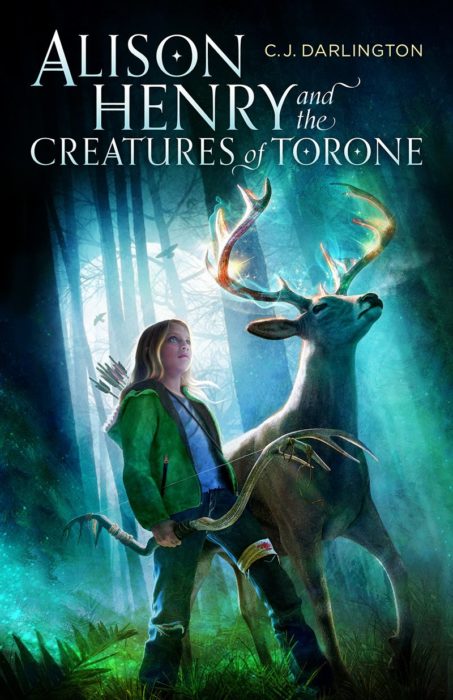Are Talking Animals Biblical?
Wilbur the pig from Charlotte’s Web.
Peter Rabbit.
Eeyore.
Bree from C. S. Lewis’s The Horse and His Boy, and even Aslan the Great Lion himself.
Talking animals are as pervasive in children’s literature as orphans.
I know I’ve always been fascinated with the idea of my pets talking to me (You mean, you really hate that brand new toy I just bought you? You want what for dinner?) Maybe it’s a dream for all animal loving children, but for some of us the desire to read about talking animals never leaves, even when we’re adults. Am I the only one who wishes that for just one day of the year I could hear what my dog is really thinking?
This week we feature C. J. Darlington and her novel Alison Henry and the Creatures of Torone in Lorehaven Book Clubs. Stop by the flagship book club on Facebook to learn more about this story.
Breaking: Subscribe to Lorehaven Magazine for free to download our spring 2018 issue instantly. Then this Monday, July 9, you can download our summer 2018 issue!
But just like the debate of whether swords and sorcery should be included in novels written by Christians, some could make a case against those talking beasts. After all, God didn’t make my dog with a tongue that can speak.
Or did he?
Have you ever wondered if maybe, just maybe, animals could speak to humans before the fall of man? What if this gift of speech was lost in the same breath as our gift of living forever in these flesh and blood bodies?
Is it a crazy idea? Heresy? Or is it just plain wishful thinking? Maybe it’s all three. But there are two Biblical accounts that make me wonder.
Think about this: Eve heard a serpent speak in the Garden of Eden, but did she seem at all surprised? Did she question her sanity and ignore the crazy snake or run away and chalk it up to a little too much time in the sun? Nope. What did she do? She started a conversation with the animal as if it was an everyday occurrence.

“Familiar but satisfying, and female heroes lend a modern flair . . . good comfort food for people who dream of other realms.” — Lorehaven Magazine
What about Balaam? Here’s a guy who’s minding his own business, riding down the road with the top down on his donkey when all of the sudden said ride scrapes his foot against the guard rail. We all know the story, right? Mr. Balaam has a little road rage incident, grabs the nearest branch, and gets ready to take out his fury on that innocent beast of burden. So the donkey tells him off.
Does Balaam act even a little surprised the animal talks? Nope. He too begins a conversation with the beast as if it’s the most ordinary thing in the world to have a discussion about ethics with your donkey!
I know, I know. The Bible doesn’t explicitly say animals could talk before the fall, or any time for that matter. It also doesn’t tell us there are eight planets orbiting the sun. (Maybe it if did poor Pluto wouldn’t have been so disgraced.) I’m certainly not looking to create a new doctrine or hoping my pup named Shiny (that’s not a typo) will finally be able to tell me whether his name embarrasses him.
But this is why I didn’t shy away from including talking animals in my fantasy novel Alison Henry and the Creatures of Torone. In fact, one of the central themes of the book deals with the loss of communication between the creatures and the humans. Something or someone must bridge the gap. Enter Alison Henry, a normal girl from our normal world who finds herself in the land of Torone where she’s the only one who can hear the animals speak. It’s an adventure even an imaginative girl like her has a hard time grasping.
Here’s the thing. Whether God intended for animals to speak in our world or not, sometimes we just need to listen a little harder. Maybe I’ll never hear my pets verbally espouse the virtues of milk bones, but that doesn’t mean I can’t look into their eyes and see real love. Or feel it in my own heart toward them. That’s a theme that can benefit every story, don’t you think?
Oh. Did I mention that in Torone, dogs can fly? Wonder what the Bible would say about that!
“Familiar but satisfying, and female heroes lend a modern flair . . . good comfort food for people who dream of other realms.”
— Lorehaven MagazineExplore C. J. Darlington’s novel Alison Henry and the Creatures of Torone in the Lorehaven Library.
Read our full review exclusively from the spring 2018 issue of Lorehaven Magazine!








































And don’t forget the talking trees and thorn vines used in parables in the old testament.
My kitties speak mostly in body language, the major exception being when the ones who hate each other play a round of “She’s LOOKING AT ME” (I do not like this game.)
One of them will give funny little complaint-squeaks when I follow her around telling her “no” about the scratching choices she makes. “Don’t you talk back to me,” I say to her.
Cats are so hilarious! I always thought I was a dog person, but there’s something about cats too. I think I am more like a cat personally. 🙂
C. S. Lewis has a poem called “Impenitence” where he declares that he will never repent for reading stories about talking animals. He discusses what talking are in literature and why we so delight in reading about them. It’s in his volume of collected poems, and though it was probably written to simply be funny, it is–like a lot of Lewis’s poetry–a critical and theoretical statement.
I haven’t read that one, David. Will have to look it up!
This is exactly the kind of quality theological debate I’m here for. 10/10
Glad you like it! Stephen had the great idea of the topic, and then it reminded me of those Bible stories I’d wondered about… 🙂
First off, lemme say that oh yeah do animals communicate, yes, and sometimes clearly enough that I could transcribe into English. 🙂 Even jokes.
Secondly, I am constantly amazed at some of the questions that come up, such as that someone might worry whether talking animals are biblical. We are not constrained to only concrete entities specifically mentioned in the Bible. Space shuttles are not “biblical” but are real. Ancient South America is not in the Bible but is real. And the Tooth Fairy is not in the Bible, is not real, but is still fun to talk about.
Bring on the talking animals! 😀
Yes, I agree! Bring them on!
“…riding down the road with the top down on his donkey.” Awesome line.
LOL. Thanks!
I’m almost done writing a story similar to yours, that deals with a fictional version of Nephilim. I’ll get plenty of flak for fictionalized them for the story instead of applying existing theological theories about what Nephilim are. So that will take some heat off of you. ?
I consider Jesus’ parables examples of fantasy stories. Who would believe that a Jewish son would ever ask his father for his inheritance before his father dies? Let alone that the father gives it instead of disowning him for his rude request? And when the rich man and Lazarus are seen in the afterlife, is that a true event featuring the Lazarus we know before Jesus raised him? We don’t know, but the point of the story is not whether it’s true, but whether its meaning is true. Parables are earthly stories with heavenly meanings. Our stories might not be parables, but what matters is their meaning. Not whether those truths come through a talking donkey.
THIS is what “Christians” spend their time worrying about? Come ON!
To be honest, talking animals in stories are usually not a big deal for Christians, so it’s probably more that we’re ‘wondering’ or ‘contemplating’ rather than ‘worrying’.
Down, gentle reader. 🙂 It’s just a discussion for fun. And why the word “Christians” in quotes? That seems strikingly odd. Even judgmental in a wrong sense. Unless you can provide a better explanation for the quotes other than, “Real Christians ought not talk about this sort of thing.”
I tried submitting to some print mags a while back. One absolutely prohibited stories about talking animals and “other occult” themes. So, yes, it is an issue for some.
Hmm, I’m inclined to think animals couldn’t talk any more before the fall than afterwards. Some of them are certainly created to communicate with humans though, and they can understand quite a lot, but they’re not like us. They don’t think on the same level as us, so even if real animals could talk, I don’t think they would talk like we do.
Also based on anatomy, I don’t think most animals should be able to talk. They simply can’t make the sounds. (That donkey and that snake included. It wasn’t exactly them talking.)
I’m quite okay with talking animals in books. My dad had an idea though, that humanizing animals can contribute to people seeing real animals as more like us than they really are, as possibly more important than people. After all, in the world’s view, we’re not any more than highly intelligent (or maybe not so intelligent) animals. I believe(As I’m sure most of you do) that in our world, the life of a person is worth so much more than the life of an animal.
But just because the world is all topsy-turvy and mixing up animals and people, doesn’t mean we should have animals that can talk in our stories. It’s speculative, we’re asking what if, and I see nor harm in that.
Anthropomorphizing is an issue, but I think the non-animal-rights people overestimate whether/how much animal-rights people value animals over humans. Except for extremist bungholes like PETA, most of them are not really either/or types, but also-too types. Like, we can save the children and also too these endangered speckled whatthehecks by preserving their habitat.
A few of those extreme people write for our local paper and compared thinning out animal populations to genocide.
And then there are the people who want to give animals equal rights with humans.
And now I almost sound like I don’t care enough. I don’t want anything killed unnecessarily, and I’m squeamish.
And I still like talking animals.
You’ve got some grade-A, swivel-eyed corkers right there. I don’t think most of them realize that nature’s solution for population control is largely inhumane, by means of infant mortality, starvation, and disease.
I like to think I’d earn a little credit because I’m willing to murder my own meat. Have done, too.
C.S. Lewis was not a vegetarian. In Narnia there are talking and non-talking animals. The talking beasts have souls because Aslan selected them during Narnia’s creation and breathed His life into them. So, Lewis would not have supported PETA’s nonsense, though he did oppose vivisection. A very cruel, pointless experiment on animals. I think it’s illegal now.
I love talking animals in stories, so they end up in a lot of my writings. Non human characters in general can be good for social issues and exploring Christian morals. At the very least, the fact that animals are so different than us can open up a good dialogue about how to handle a society where everyone is different from each other. (Assuming it’s a society where multiple species are living together.) Which, of course, can help us understand and figure out our society today.
Some of my recent favorite animal stories are Wings of Fire by Tui T Sutherland, Off White (http://off-white.eu/comic/prologue-page-1-2/), and The Blackblood Alliance (https://www.deviantart.com/kayfedewa#_=_)
Those three aren’t Christian, but they’re still pretty cool.
While I think it’s true serpents could talk in the Garden of Eden–at least one definitely could (and I’ve noticed the context specifically tells us how intelligent serpents were back then), having spoken language is one of the great dividers between being made in the image of God and not being so made (as opposed to what human beings physically look like). So I rather doubt that animals could ever talk, barring a miracle like the one that allowed Balaam’s donkey to speak.
Though animals do communicate non-verbally, sure.
Though I don’t think anybody I ever knew seriously stressed about this issue. In fact, Christians are probably more interested in talking animals than non-Christians, since Christians are influenced by Narnia…and a lot of people who may not like Narnia think talking animals are overly cute.
I myself always wanted to be a talking bear when I was a kid. I thought it would be cool. You’ve got talking animals in your story. Very cool.
Fun fact: some members of the dolphin family, like bottlenose and orcas, have something resembling a language, and orcas even have dialects. Or “dialects,” because there is still debate about what minimum requirements for language is. When I was watching some animal docus while I was crocheting, some scientists created a pidgin with new vocab that wild bottlenose would pick up (with some pronunciation issues) in order to play a game with the humans.
Wonderful article, CJ. I know this wasn’t your main point, but I think animals and humans could communicate from the beginning, too. But I think the change happened after the flood, when the animals became afraid of humans (which is Biblical) and of one another. Interesting to speculate. 😉
Becky
Good piece. It made me smile and think at the same moment. A difficult task for me. Thanks and good writing to you.
Don’t forgot those heroic rabbits in Watership Down!
Some folks just dislike fantasy. That’s okay as long as they don’t make it an article of faith. High in conscientiousness but very low in openness.
You need to have worldbuilding “Rules” from the start. C.S. Lewis had animals acting like people. They tended to avoid human tools in favor of teeth and claws during battle. They also married. (The Horse and His Boy mentions Bree the horse marrying at the end of the book.)
It has been a few years since anyone has commented on this topic, but see what has happened in the meantime by checking out the YouTube page “What About Bunny?”. She is a dog who is talking, not with a voice, but through a system of buttons developed for humans unable to speak. She is way ahead of the pack, but lots of other dogs and cats are learning it also. And she doesn’t just ask for food or toys. She forms complex thoughts.